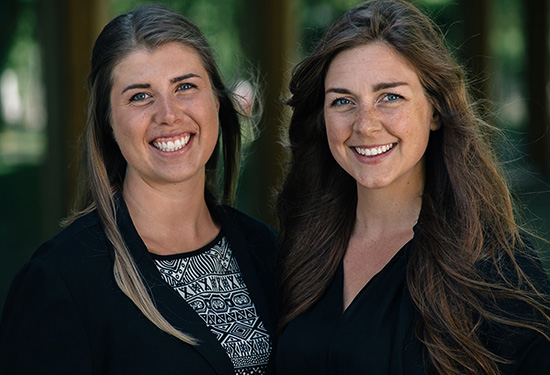One in four people will have a mental health and/or substance-use condition within their lifespan.
Can mindfulness help promote recovery and participation in daily activities for these individuals?
This was the question that drove Melanie Tait and Kendall Miller throughout their time as students in the Faculty of Medicine’s Master of Occupational Therapy program. As part of their training and academic experience, they conducted a year-long research project examining the impact of mindfulness, and learning more about its value as a therapeutic tool.
Their research findings garnered the Canadian Association of Occupational Therapy Student Poster award and will be presented next spring at the World Federation of Occupational Therapists conference in Capetown, South Africa.
We sat down with Tait and Miller to learn more about their research and what they plan on doing next.

Melanie Tait (left) and Kendall Miller (right) will be graduating from the Master of Occupational Therapy program this fall.
What attracted you to the occupational therapy program?
MT: I have always been interested in health and wellness but initially struggled to decide which healthcare profession to pursue. However, I was drawn to occupational therapy because of the opportunity to work with individuals in a creative and holistic way.
KM: I was drawn to the philosophy of occupational therapy because I knew I wanted to be part of a profession that focuses on quality of life and meaning – one that has a social justice lens and considers a person in their entirety.
For your graduate research project you investigated how mindfulness can help promote recovery and participation in daily activities for people with mental health conditions and/or substance use. Tell me more about your research.
KM: Mindfulness as it impacts disease has been well studied. What was unique about our study was the occupational therapy focus on everyday life. We wanted to see if mindfulness impacted how people with mental health conditions and/or substance use engage in the things they do every day. In understanding mindfulness through this lens, implementation by occupational therapists can be better supported as an evidence-based practice.
What do you feel is the most important finding from your project?
MT: Our research highlights that there is a place for mindfulness-based interventions in occupational therapy practice, especially as a means to enable meaningful participation for individuals with mental health conditions and substance use. Mindfulness provides clients with an avenue to consciously become aware and therefore become more open to experiencing day-to-day activities. The implications from this study support the push for occupational therapists to use client-centered outcome measures that address the personal experience of clients’ occupations.
What advice would you offer prospective students wanting to pursue a career in research?
MT: I think the term “research” in itself can seem daunting to many, but my advice is not to let that scare you. Begin by finding mentors in the field and focus on one step at a time. Be mindful to spend time reflecting on your own interests, values and beliefs, throughout the journey, and try your best to keep joy and balance in your life.
KM: Take the time to find a topic of research you are truly curious and passionate about. Find team members that feel the same way about the topic.
What’s next for you?
MT: Currently I am working as a clinical occupational therapist in a long-term-care setting in Whitehorse, Yukon. In terms of research, I am still connected with the team to continue to research mindfulness in occupational therapy practice.
KM: I am building my own occupational repertoire; spending time with friends and family, pursuing new and old leisure interests and working as an occupational therapist in community mental health. My hope is to continue to learn through practice and work with populations who experience multiple barriers to participation in everyday life. I imagine it is likely I will run into a research question somewhere down the road that will bring me back to UBC.